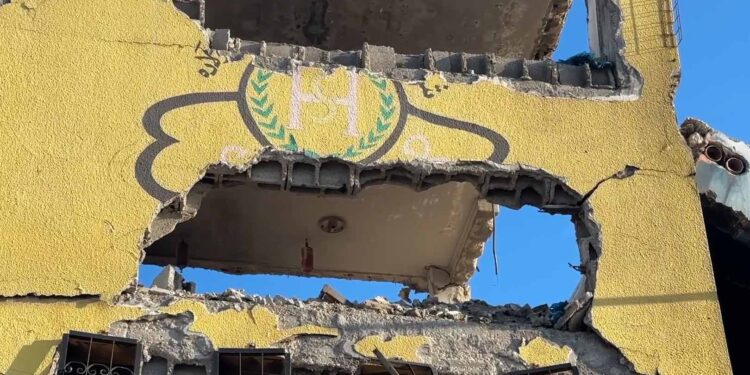Palestinian businessman Ahmed Shomer watches with deep sorrow the remains of his factory, which was destroyed by the Israeli army during the war launched by Israel on the Gaza Strip over the course of more than 15 months.
The “Shomer” sweets and biscuits factory is no longer vibrant as it was before, after it was subjected to comprehensive destruction that affected all aspects of production, leaving behind a profound impact on the industrial sector in Gaza.
The land that used to produce thousands of tons of sweets and biscuits has turned into a scene of desolation, and the four floors that used to house the latest production lines are today just piles of debris and rubble.
Over the course of 40 years of continuous work, the “Shomer” factory was one of the most prominent features of local production in Gaza, and was one of the largest facilities that provided basic food products to citizens and supported thousands of Palestinian families.
The Schumer factory was not the only one that was destroyed; The Israeli war machine targeted many other factories that formed the backbone of the local economy, which contributed to the collapse of the manufacturing sector, which is a vital pillar of the Gazan economy.
“Shomer” is located in the middle of the Gaza Strip, and is considered an important center that provides job opportunities for thousands of workers who depend on this vital resource, while the United Nations has confirmed that more than two million Palestinians in the Gaza Strip are in urgent need of aid to meet their basic needs.
In a press conference held last week, United Nations spokesman Farhan Haq said that the organization had increased the volume of its humanitarian aid to the Strip after the ceasefire agreement entered into force on January 19.
40 years of work
The owner of the “Shomer” factory, the Palestinian businessman Ahmed Shomer, said, “We started in this sector 40 years ago in Gaza, where our factory was small and over time it grew.”
He added, “The factory area exceeds 3 dunums of 4 floors in the Central area, and over the years we have developed and have 9 production lines, including chips, biscuits, crackers, and sweets of all kinds, in addition to comfort” (malban or lokum sweets).
He pointed out that the genocide in the Gaza Strip completely destroyed the factory and the production lines are under rubble, and the fate of 200 families whose heads work in the factory is unknown, estimating the size of the losses at 15 million US dollars.
He called on the Arab and Islamic peoples to look at Gaza, which represented a large part of its economic strength in the industrial sector.
Destruction of the economic structure
For his part, Palestinian economic expert and analyst Maher Al-Tabbaa said, “The Israeli war on the Gaza Strip resulted in severe destruction of the local economic structure.”
Al-Tabbaa expected that more than 80% of economic facilities were partially or completely destroyed as a result of the negative effects of the war.
According to the Palestinian Ministry of National Economy, 50,000 industrial and commercial facilities are spread across the Gaza Strip, until the end of 2022.
According to the World Bank, about half a million jobs have been lost from the Palestinian market since October 2023, including an estimated 200,000 jobs in Gaza, 144,000 jobs in the West Bank, and 148,000 jobs across the border from the West Bank into the Israeli labor market. .
On January 19, the ceasefire between Hamas and Israel entered into force, and its first phase will last 42 days, during which negotiations will take place to begin a second and then a third phase, mediated by Egypt, Qatar, and the United States.
Between October 7, 2023 and January 19, 2025, Israel launched a war on Gaza that left more than 158,000 Palestinian martyrs and wounded, most of them children and women, and more than 14,000 missing.



